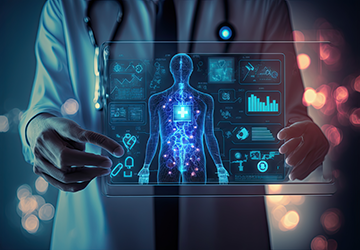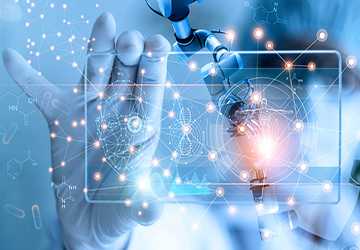Revolutionize Your Workflow: 6 AI Apps That Will Skyrocket Your Productivity
Welcome to the futuristic world of Artificial Intelligence (AI), a technology rapidly reshaping how we live, work, and interact with our surroundings.
AI is revolutionizing healthcare in many ways, including improving diagnoses, enabling personalized medicine, speeding up drug discovery, and automating administrative tasks. This article explores the transformative impact AI is having on the healthcare industry.
AI is Improving Medical Diagnoses
AI has shown great promise in improving the accuracy of medical diagnoses. Machine learning algorithms can be trained on large datasets of patient symptoms, medical histories, and test results to make diagnoses. Some advantages of AI diagnosis include:

● Consistent evaluation unaffected by human biases or fatigue
● Ability to detect patterns in massive datasets beyond human capability
● Continuous learning and improvement through new patient data
● Fast and efficient diagnosis, providing timely treatment
Research shows AI can equal or surpass the diagnostic accuracy of doctors in certain conditions like skin cancer, lung cancer, and neurological disorders. AI is not meant to replace doctors but as a tool to complement human expertise and avoid diagnostic errors.
AI is Enabling Personalized Medicine
AI allows healthcare to be tailored to individuals like never before. Algorithms can analyze a patient's genetics, lifestyle, medical records, and more to determine treatments specifically suited to them. Some applications of personalized AI medicine include:
● Screening patients for diseases based on genetic predispositions
● Predicting patient's reactions to drugs based on biomarkers
● Adjusting medication dosages based on ongoing patient monitoring
● Creating customized treatment plans for chronic illnesses
With AI, the one-size-fits-all approach of the past can be abandoned in favor of healthcare that meets each patient's unique needs.
AI is Speeding Up Drug Discovery
The traditional drug discovery process takes over a decade and costs billions. AI has the potential to accelerate this process and make it more cost-effective massively. Some examples of how AI assists in drug discovery include:
● Screening countless drug combinations via high-throughput virtual experiments
● Analyzing vast amounts of research data and literature not quickly processed by humans
● Using generative AI models to create novel molecular structures with desired properties
● Predicting drug toxicity and efficacy without time-consuming physical trials
AI drug discovery is critical for pharmaceutical companies to remain innovative and competitive. It allows more ideas to be tested for finding potential new lifesaving medications.

AI is Automating Healthcare Administration
Healthcare systems generate enormous amounts of data through patient records, insurance claims, operation logs, etc. AI is being applied to streamline administrative processes and reduce costs. Applications include:
● Processing paperwork like claims forms and billing using natural language processing
● Managing supply chain logistics and inventory for hospitals more efficiently
● Optimizing hospital operations flow using AI scheduling assistants
● Providing virtual patient customer service through chatbots
Automating repetitive tasks allows healthcare workers to dedicate their time to more meaningful work, like patient care.
AI is Enhancing Medical Imaging
Medical imaging like X-rays, CT scans, and MRI are a cornerstone of diagnosis. AI can improve the acquisition and analysis of images. Applications include:
● Adjusting imaging devices in real time to improve image quality
● Using machine vision to detect abnormalities and flag them for doctors
● Segmenting anatomical structures from images more precisely
● Generating 3D reconstructions from 2D image slices
By augmenting imaging, AI allows doctors to gather more accurate visual information about patient health and accelerate diagnoses.
Conclusion
AI is driving a revolution in healthcare, from diagnosis to drug discovery to administration. Machine learning has enormous potential to improve patient outcomes through personalized treatment plans, improve access to care, lower costs, and make medicine more effective overall. While still in its early stages, AI will likely continue transforming healthcare for decades.
A great smartphone doesn't have to be expensive. Here, we round up the best value phones of 2023 that offer good performance and features at affordable prices.
Our planet is facing serious environmental challenges. Climate change has massively disturbed the Earth's natural balance, increasing Earth's temperature.
Taking great photos with your phone involves techniques like understanding lighting, composing shots, editing pictures, and using camera features. This article provides tips to take your phone photography to the next level.
AI is revolutionizing healthcare in many ways, including improving diagnoses, enabling personalized medicine, speeding up drug discovery, and automating administrative tasks. This article explores the transformative impact AI is having on the healthcare industry.
Welcome to the futuristic world of Artificial Intelligence (AI), a technology rapidly reshaping how we live, work, and interact with our surroundings.
Taking great photos with your phone involves techniques like understanding lighting, composing shots, editing pictures, and using camera features. This article provides tips to take your phone photography to the next level.
